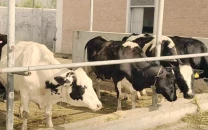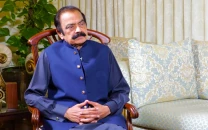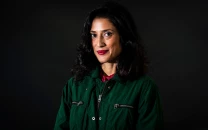The story of Pakistan's Qandeels
The dominant patriarchal culture that thrives on seeking to control women is finding itself on the back foot

Qandeel Baloch. PHOTO: FACEBOOK
Post her killing, Qandeel’s story is being viewed as that of a fiercely independent and courageous woman who confronted cultural and social barriers restricting her from seeking a life of her own choice. This may very well be the case. However, Qandeel was one of countless Pakistani women of modern times who are seeking to engage the opportunities afforded by a globalised world, and by way of their actions are challenging the dominant narrative that sees women’s roles and position in society from a patriarchal perspective. Qandeel’s intelligent use of social media to establish herself as a star personality and to communicate her message on issues she felt strongly about does suggest how she developed a whole range of skill-set while negotiating her way out of her conservative family background to pursue her aspirations.
Mufti Abdul Qavi investigated over Qandeel Baloch’s honour killing
Today’s modern, globalised era offers immense opportunities for those who seek to engage the system. The fast-paced changes are reflected in technological advancement, especially evident in the communications sector, increased mobility, growing urbanisation and commercialism, and the rapid expansion of information and knowledge spectrum have opened up opportunities for citizens with little gender discrimination, and social or economic biases.
To the surprise of torchbearers of a traditional male-centric culture, Pakistani women are responding more proactively to the changing times than men. This is evident in their increased participation in economic activity, dominant presence in certain fields and setting of standards of excellence, both in their academic and professional endeavours. Socially too, they are becoming more outgoing, willing to take risks and displaying reluctance to bow down before the patriarchal norms that normalise subjugation of their minds and bodies. All this is evident in statistics documenting development in the social and economic sectors.
In a recent status report titled ‘Women's Economic Participation and Empowerment’, it has been noted that there has been a glacial increase in women’s labour force participation over the past decade from a low of 19% in 2003-04 to almost 26% in 2014. Admittedly, this is still way below acceptable rates for a progressive economy, but it nevertheless marks advancement. Unfortunately, this female representation in the labour force is heavily dominated in the agriculture sector where over 72% of women are engaged. It is a gross injustice that this participation is not translated into economic empowerment of women, as this is mostly unpaid family work.
Qandeel Baloch strangled to death by brother in suspected honour killing
Though they are vastly denied the right to education, Pakistani girls outshine male students at all levels. For the past many years, board examinations all over the country are consistently recording female students as top rankers. Women are increasingly taking the opportunity to enrol in higher education, where their representation at Master’s level in all four provinces is much higher compared to other educational levels. In Punjab, the Gender Parity Index is 1.1, suggesting a higher number of women at Master’s level than men. Their outperformance of boys in selection tests for medical colleges evoked a strong reaction from a regressive state that slapped a quota system accusing women of wasting state resources by not taking up a full-time job in favour of marriage after studies. This is despite the fact that – as documented in the data – 58% of women medical graduates work after completing their education.
There is no performance evaluation of women’s work in different fields with the exception of legislative business that ranks women as high-achievers in the parliament. However, the steady rise in their participation in sectors such as teaching, nursing, beauty and grooming, domestic services, banking, media, marketing, non-governmental organisations, legislation, politics and legal professions does point towards women’s increasing eagerness to make use of available employment opportunities. Successive labour force surveys have also recorded their increased participation in the manufacturing sector. This indicates a leap in the face of limitations such as low skills, access to means of transportation and a ‘compulsory’ domestic care-giver’s role. High visibility fields, such as show business and sports, too have women joining in a leadership position.
Socially too, women are seeking to break traditional boundaries and engage the system to seek a life of dignity. Despite the total absence of a state-backed support system for single women and mothers, divorce is less of a taboo today as it was in the past. Though Pakistan maintains no statistics on the rate of divorce, news reports and features citing sources from the judiciary on the subject suggest increasing cases of women filing for dissolution of marriage, sighting marital abuse as the prime reason.
5 times Qandeel Baloch was brutally honest
In the midst of these developments, the dominant patriarchal culture that thrives on the back of male ownership of women’s bodies and minds, and seeks to control women’s mobility, is finding itself on the back foot. It can no longer comfortably justify its traditional assertions about male supremacy and women’s so-called weak mental and physical strength to engage the system. Women by way of their participation in social and economic domains have effectively countered any narrative of them being incapable of moving with changing times. If anything, women, through their performance, have shown they are prepared for challenges while also willing to reinvent themselves to keep pace with the demands of a fast evolving environment.
Qandeel Baloch was one such woman. She fearlessly took up the opportunities offered by a modern information-technology led era and displayed disregard for regressive cultural boundaries that sought to restrict her path for social and economic mobility. Her story needs to be seen in the context of increasing eagerness of Pakistani women who are willing to redefine their lives and write their own destinies outside of the patriarchy driven definition of “women-should-not”.
Zeenia Shaukat is an independent professional. She works on rights-based research, advocacy, capacity building and media communications primarily on issues related to human rights, development, and social justice.



















COMMENTS
Comments are moderated and generally will be posted if they are on-topic and not abusive.
For more information, please see our Comments FAQ